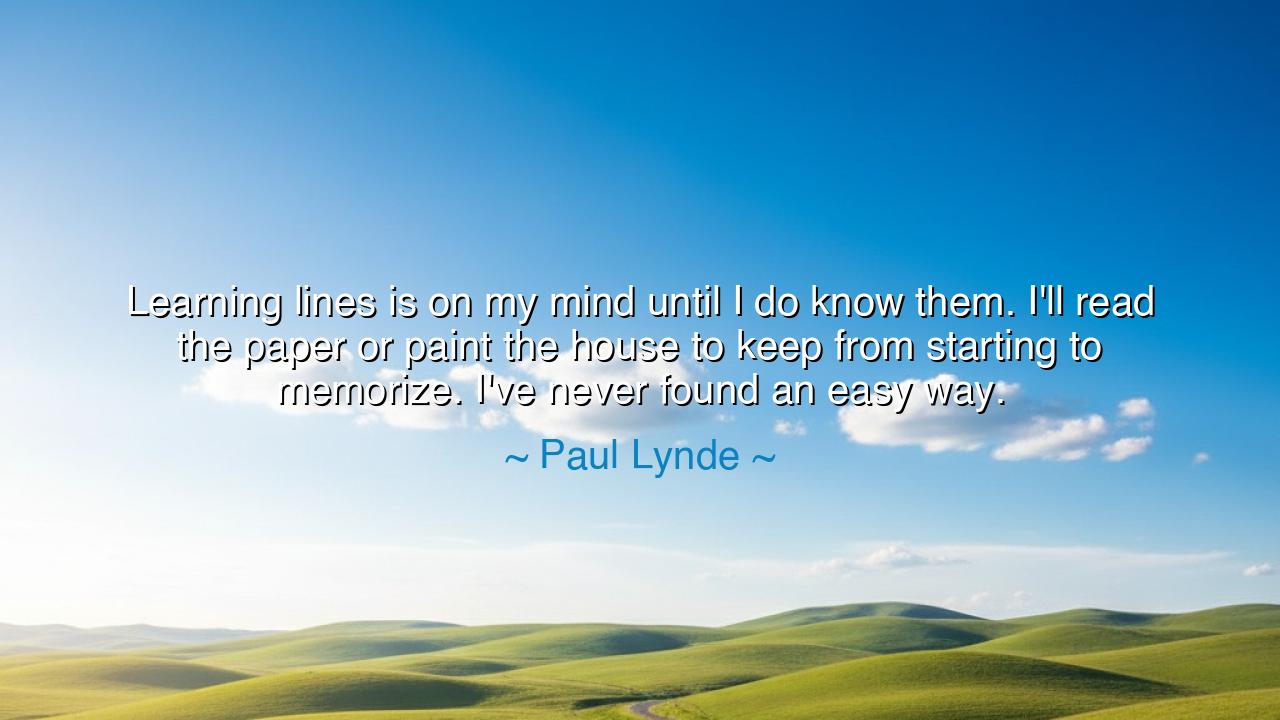
Learning lines is on my mind until I do know them. I'll read the
Learning lines is on my mind until I do know them. I'll read the paper or paint the house to keep from starting to memorize. I've never found an easy way.






Paul Lynde, known for his sharp wit and theatrical presence, once confessed with both honesty and weariness: “Learning lines is on my mind until I do know them. I’ll read the paper or paint the house to keep from starting to memorize. I’ve never found an easy way.” These words, though spoken of the actor’s craft, echo far beyond the stage. They reveal the eternal struggle between discipline and distraction, between the work we must do and the resistance that rises to keep us from doing it.
The meaning of this quote rests in the truth that mastery is rarely accompanied by ease. Lynde admits that learning lines—the very foundation of an actor’s art—is a weight upon his mind until the task is complete. Yet even as he feels the pressure, he turns to diversions: the paper, or even the labor of painting a house, anything to postpone the work of memorization. His words remind us of a universal battle: the avoidance of the hard but necessary task, even as its shadow lingers over us.
The origin of this reflection is rooted in the life of performance, where every actor must commit words to heart until they flow as naturally as breath. For Lynde, a man whose talent for comedy seemed effortless, the truth was that even he wrestled with the grind of preparation. Behind the laughter and the spotlight lay nights of toil, frustration, and repetition. His confession pulls aside the curtain and reveals that even the gifted do not escape struggle, and that brilliance on stage is purchased through persistence off stage.
History bears witness to this same struggle in other realms. Consider Demosthenes, the great orator of ancient Greece, who as a young man stuttered and lacked confidence. To master the art of speech, he filled his mouth with pebbles and practiced his lines by the roar of the sea. There was no “easy way” for him either—only labor, repetition, and the refusal to surrender. Like Lynde with his scripts, Demosthenes understood that greatness comes not by shortcuts, but by walking through difficulty with determination.
There is something deeply emotional in Lynde’s confession. It speaks to the loneliness of preparation, when no audience is watching, when the applause feels distant, and when only the mind’s resistance stands in the way. His words carry a quiet honesty: there is no trick, no secret method. The only path is to begin, to struggle, and to endure until the lines are mastered. In this, he reflects the truth of all crafts—that beneath the glitter of performance lies the grind of unseen labor.
To future generations, Lynde’s words offer both warning and encouragement. The warning: do not believe the myth of effortless success, for even the masters wrestle with preparation. The encouragement: though the work may feel heavy and the distractions tempting, perseverance will always bear fruit. His honesty frees us from despair, for if even the celebrated actor found memorization hard, then our own struggles are not signs of weakness, but signs of being human.
The lesson is clear: do not flee from the difficult, but accept it as part of the path to mastery. Practically, this means acknowledging your own distractions without shame, but returning always to the task at hand. Read the paper, paint the house if you must—but return to the lines. For there is no “easy way,” only the way of persistence, repetition, and eventual triumph. What is true of acting is true of all endeavors: the hardest tasks are often the ones most worth completing.
Thus Paul Lynde’s words endure: “I’ve never found an easy way.” Let them echo not as complaint, but as wisdom. For the absence of an easy way is itself the proof of value. The road to skill, to mastery, to greatness, is not paved with shortcuts, but with sweat and struggle. And those who embrace this truth will not only memorize their lines—they will write their legacy upon the stage of life.






AAdministratorAdministrator
Welcome, honored guests. Please leave a comment, we will respond soon